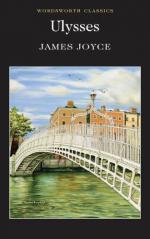—What is a ghost? Stephen said with tingling energy. One who has faded into impalpability through death, through absence, through change of manners. Elizabethan London lay as far from Stratford as corrupt Paris lies from virgin Dublin. Who is the ghost from limbo Patrum, returning to the world that has forgotten him? Who is King Hamlet?
John Eglinton shifted his spare body, leaning back to judge.
Lifted.
—It is this hour of a day in mid June, Stephen said, begging with a swift glance their hearing. The flag is up on the playhouse by the bankside. The bear Sackerson growls in the pit near it, Paris garden. Canvasclimbers who sailed with Drake chew their sausages among the groundlings.
Local colour. Work in all you know. Make them accomplices.
—Shakespeare has left the huguenot’s house in Silver street and walks by the swanmews along the riverbank. But he does not stay to feed the pen chivying her game of cygnets towards the rushes. The swan of Avon has other thoughts.
Composition of place. Ignatius Loyola, make haste to help me!
—The play begins. A player comes on under the shadow, made up in the castoff mail of a court buck, a wellset man with a bass voice. It is the ghost, the king, a king and no king, and the player is Shakespeare who has studied hamlet all the years of his life which were not vanity in order to play the part of the spectre. He speaks the words to Burbage, the young player who stands before him beyond the rack of cerecloth, calling him by a name:
Hamlet, I am thy father’s spirit,
bidding him list. To a son he speaks, the son of his soul, the prince, young Hamlet and to the son of his body, Hamnet Shakespeare, who has died in Stratford that his namesake may live for ever.
Is it possible that that player Shakespeare, a ghost by absence, and in the vesture of buried Denmark, a ghost by death, speaking his own words to his own son’s name (had Hamnet Shakespeare lived he would have been prince Hamlet’s twin), is it possible, I want to know, or probable that he did not draw or foresee the logical conclusion of those premises: you are the dispossessed son: I am the murdered father: your mother is the guilty queen, Ann Shakespeare, born Hathaway?
—But this prying into the family life of a great man, Russell began impatiently.
Art thou there, truepenny?
—Interesting only to the parish clerk. I mean, we have the plays. I mean when we read the poetry of king Lear what is it to us how the poet lived? As for living our servants can do that for us, Villiers de l’Isle has said. Peeping and prying into greenroom gossip of the day, the poet’s drinking, the poet’s debts. We have king Lear: and it is immortal.
Mr Best’s face, appealed to, agreed.
Flow over them
with your waves and with your
waters, Mananaan,
Mananaan MACLIR ...




